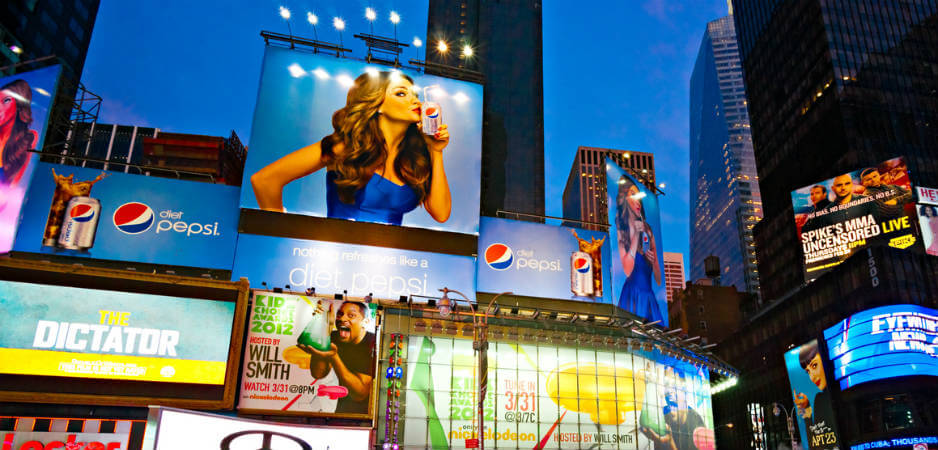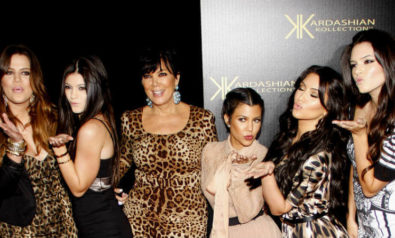Stardom sells, but it may not always be as effective in advertising as you might think.
Some of today’s most popular commercials feature a who’s who of pop culture. The Wall Street Journal credits the late Michael Jackson for helping usher in a new age of celebrity advertising when he signed a $5 million sponsorship deal with PepsiCo. in 1984. Of course, other celebrities had appeared in ads before Jackson, but some A-level stars had refrained out of fear of hurting their reputation. But once the King of Pop did it, other stars began to jump on the bandwagon.
There are numerous advantages to using celebrities to promote products. First of all, they have tremendous stopping power: Stars attract attention and can help cut through the clutter of other advertising. The Got Milk print campaign made milk seem cool by showing athletes, rock stars and politicians sporting the famous milk mustache. My favorite Got Milk print ad showed the rock band Van Halen dumping milk over their heads instead of settling for the traditional mustaches.
The public idolizes celebrities and advertisers hope the admiration for the celebrity will be transferred to their brand. The trick is to make sure the celebrity doesn’t overshadow the brand. Case in point, Sprite recently hired basketball great LeBron James to appear in a number of their TV spots. Research has shown that the adoring public loves seeing LeBron in the commercials, but had little recall for what brand he was promoting. King James’ star is shining brighter than the soda he was paid to advertise.
Social media, in turn, makes celebrities seem more accessible to fans. Today it’s common to have celebrities share their daily experiences — including their brand encounters — with their fans on Facebook, Twitter and other platforms. Old Spice hired a former NFL player to star in their “The Man Your Man Could Smell Like” online spots. These commercials became so popular that other celebrities, including Ellen DeGeneres and Christina Applegate, started tweeting and blogging about these outrageous ads.
A celebrity’s social media profile can influence an advertising agency’s decision to hire a star as their brand ambassador. It’s not unusual for agencies to ask celebrities about how many fans they have on Facebook, for example. Singer Taylor Swift credits her multi-year contract with Coca-Cola to her social media popularity. Former President Barack Obama was the first national candidate to embrace social media. Ultimately, he was elected to two terms in the White House and credits much of his “rise to fame” with his online campaigning.
Public Fascination
The public is fascinated with the personal lives of celebrities. Sometimes even the stars’ missteps or troubles can inspire ideas for persuasive messages. For example, folk singer Willie Nelson has a history of getting speeding tickets, so Volkswagen recently put him in one of their commercials. Willy is seen honking, waving and smiling as he goes zooming past other drivers along the California highway. Willy’s not about to slow down, but VW drivers should be more careful and mind the speed limit.
Famous people’s unique characteristics can help communicate the selling idea. The 7-foot-5 basketball star Yao Ming appeared with Verne Troyer (better known perhaps as Mini-Me from Austin Powers) in ads promoting Apple’s 12-inch and 17-inch laptops. Yao is shown holding the smaller screen, while Verne has the big screen. The two stars help further the selling idea of size in a dramatic way.
Stars are also seen as experts in their fields. Making a relevant connection between the celebrity and target audience is critical. When BFGoodrich wanted to connect with extreme sports enthusiasts, it chose Olympic medalist Shaun White. He is one of the most recognized extreme athletes, so the company created a series of documentary-style videos that show him being trained in competitive driving. Its target audience was “anyone who enjoys the thrill of driving,” which includes auto enthusiasts and gearheads.
The Coming Storm
But celebrities are not always the answer: they’re expensive. Depending on how popular the celebrity is, they can sometimes demand upward of a million dollars for a 30-second commercial. Other less popular stars may work for less money and sometimes they’ll do the commercials for trade. For example, Rex Ryan, former New York Jets and Buffalo Bills head coach, agreed to making a season’s worth of TV spots for a regional tire franchise in exchange for a brand new pick-up truck. It’s all relative: The bigger the star, the bigger the pay-out.
They’re often nothing more than a quick fix. Stars can overshadow the message. Sometimes if the celebrity is bigger than the brand, the audience remembers the star and not the product. After a Skittles Super Bowl spot ran two years ago, people surveyed after the game remembered the Steven Tyler commercial, but had trouble remembering the spot was for. The Aerosmith lead singer overshadowed the Skittles brand.
They may lack credibility. Lance Armstrong was a genuine American hero. The United States Post Office endorsed the world champion cyclist for most of his Tour De France championships, but soon after his doping scandal it dropped Armstrong. In similar fashion, Bill Cosby was the long-time spokesman for Jell-O gelatin, but after allegations of improper sexual behavior surfaced, the dessert brand quickly parted ways with the comedian.
Consider the following from the Federal Trade Commission: The FTC requires all celebrities to actually use the products they are advertise. But 63% of people surveyed in a study published by Advertising Age magazine said they believe that “they’re just doing it for the money,” and 43% believed celebrities “don’t even use the product.”
Other pitfalls may include having the celebrity disparage your brand when they think no one’s listening. Such was the case when NBA star Gilbert Arenas told the public that he was not going to wear the Adidas sneaker that had been designed for him.
Bad press about the celebrity can hurt the sponsor. Kellogg’s fired Olympic swimmer Michael Phelps after a British tabloid published photos of him smoking pot at a campus party. Charlie Sheen lost several “family values” brands after his infamous public meltdowns. O.J. Simpson, once one of the most popular endorsers, promoting brands like Avis Rent-A-Car and ABC’s Monday Night Football, instantly lost any and all endorsement deals. After the double-murder trial, no company wanted to go near the O.J. brand. Even the Buffalo Bills (the NFL team Simpson played most of his career for) cut off all ties to him. The Pro Football Hall of Fame considered removing his bust in their museum. The NFL thought it would reflect poorly on their brand. Ultimately, they decided to keep Simpson’s statue in tact. It is safe to assume that O.J. probably won’t be asked to appear in any upcoming ads.
Bob Garfield, an ad critic at Advertising Age, says that “having a highly paid, highly visible endorser is like having an expensive beach house along the coast. It’s great if you don’t mind lying awake all night worrying about the approaching storms.”
The views expressed in this article are the author’s own and do not necessarily reflect Fair Observer’s editorial policy.
Photo Credit: MasterLu
Support Fair Observer
We rely on your support for our independence, diversity and quality.
For more than 10 years, Fair Observer has been free, fair and independent. No billionaire owns us, no advertisers control us. We are a reader-supported nonprofit. Unlike many other publications, we keep our content free for readers regardless of where they live or whether they can afford to pay. We have no paywalls and no ads.
In the post-truth era of fake news, echo chambers and filter bubbles, we publish a plurality of perspectives from around the world. Anyone can publish with us, but everyone goes through a rigorous editorial process. So, you get fact-checked, well-reasoned content instead of noise.
We publish 2,500+ voices from 90+ countries. We also conduct education and training programs
on subjects ranging from digital media and journalism to writing and critical thinking. This
doesn’t come cheap. Servers, editors, trainers and web developers cost
money.
Please consider supporting us on a regular basis as a recurring donor or a
sustaining member.
Will you support FO’s journalism?
We rely on your support for our independence, diversity and quality.













